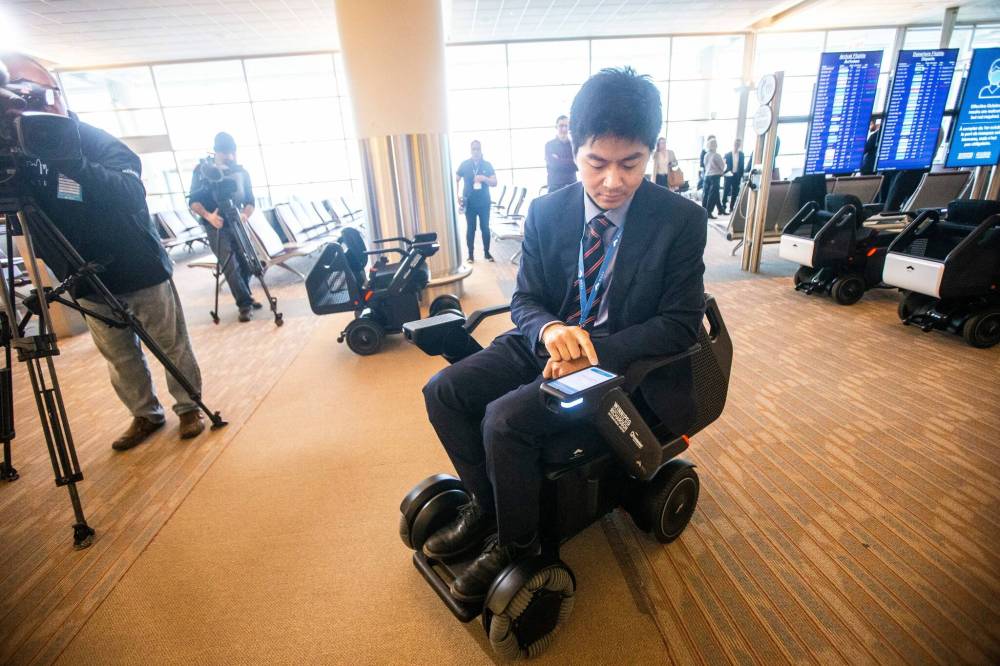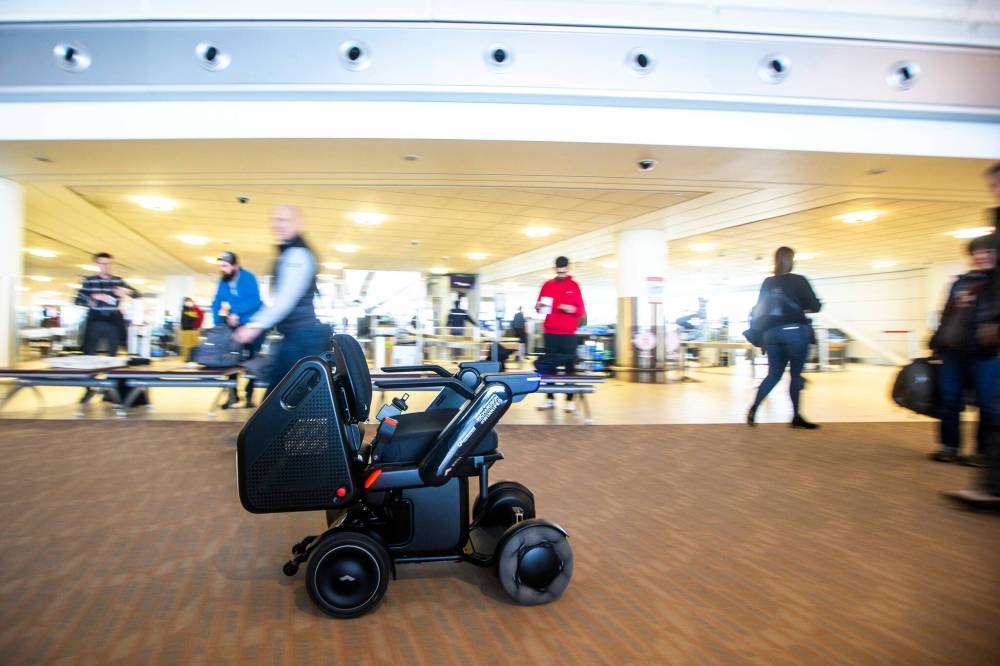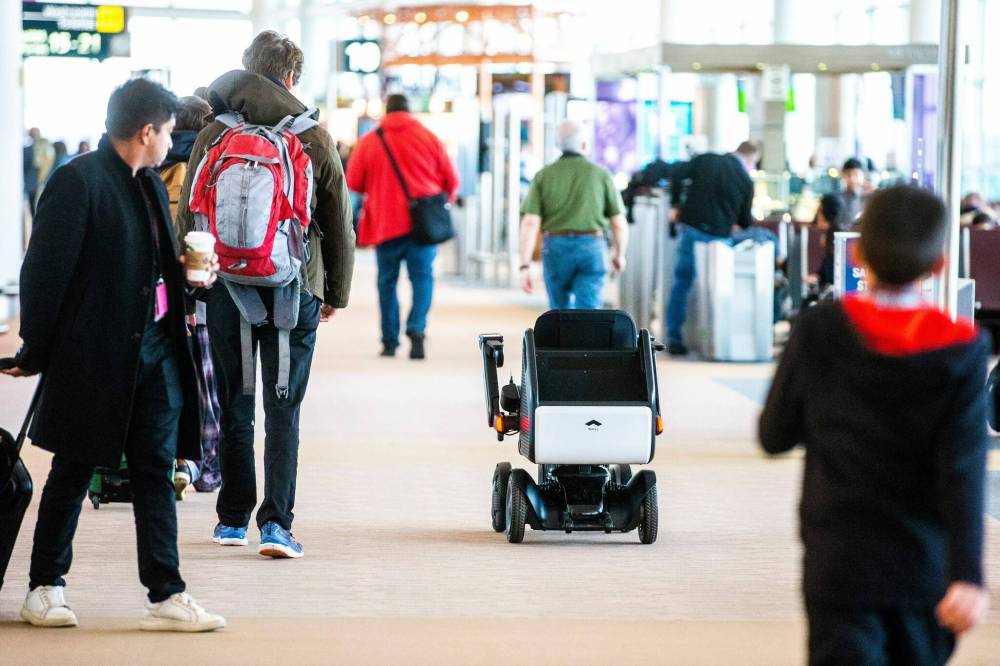Automated accessibility
Local company teams up with Japanese outfit to offer continent's first autonomous airport wheelchairs
Advertisement
Read this article for free:
or
Already have an account? Log in here »
To continue reading, please subscribe:
Monthly Digital Subscription
$1 per week for 24 weeks*
- Enjoy unlimited reading on winnipegfreepress.com
- Read the E-Edition, our digital replica newspaper
- Access News Break, our award-winning app
- Play interactive puzzles
*Billed as $4.00 plus GST every four weeks. After 24 weeks, price increases to the regular rate of $19.95 plus GST every four weeks. Offer available to new and qualified returning subscribers only. Cancel any time.
Monthly Digital Subscription
$4.99/week*
- Enjoy unlimited reading on winnipegfreepress.com
- Read the E-Edition, our digital replica newspaper
- Access News Break, our award-winning app
- Play interactive puzzles
*Billed as $19.95 plus GST every four weeks. Cancel any time.
To continue reading, please subscribe:
Add Free Press access to your Brandon Sun subscription for only an additional
$1 for the first 4 weeks*
*Your next subscription payment will increase by $1.00 and you will be charged $16.99 plus GST for four weeks. After four weeks, your payment will increase to $23.99 plus GST every four weeks.
Read unlimited articles for free today:
or
Already have an account? Log in here »
Hey there, time traveller!
This article was published 13/12/2022 (1173 days ago), so information in it may no longer be current.
In the years to come as autonomous wheelchairs zip mobility challenged travellers around airport terminals, Winnipeggers can take some pride in knowing that it happened here first.
This week, the Winnipeg Richardson International Airport became the first airport in North America to provide autonomous power-chair service that will take passengers with reduced mobility from their airline check-in kiosk, through security to their departure gate.
The service is provided by WHILL Inc., a Japanese mobility equipment manufacturer which in 2019 acquired Scootaround, the Winnipeg company that rents and services thousands of mobility devices to travellers all over North America.

The combination of WHILL’s Japanese technology and Scootaround’s experience working with mobility-challenged travellers resulted in the autonomous mobility service.
The Winnipeg airport is starting with four devices. After the user selects their destination on a touch screen, the autonomous power chair transports the passenger safely to the desired gate. The chair will then return to the designated area — on its own — to wait for another passenger.
The only other airports in the world where the service is available are Haneda and Narita airports in Tokyo where 25 of the devices are in constant use.
Kerry Renaud, the Winnipeg-based head of WHILL’s North American operations — and the former CEO of Scootaround — said with the increasing number of travellers who need assistance, internal transportation solutions within airports is a “developing demand”
It is estimated that about two per cent of the global population needs wheelchairs — not counting those who only need one on a short-term basis — and there are about 42 million occasions annually in the top 60 airports alone where airline or airport staff assist travellers by pushing then in wheelchairs.
Renaud said, “The current program of attended assisted wheelchair push service needs a refresh.”
Nick Hays, president and CEO of the Winnipeg Airports Authority said the airport is pleased to be able to provide such a value-added service.

“We are committed to being able to provide a welcoming, inclusive, accessible airport for everyone,” he said.
Trial runs of the autonomous devices have taken place in several airports across North America, including in Winnipeg since 2019.
It is a rare event that a Winnipeg company is able to secure its first commercial customer at home rather than in the export market.
“This is a homegrown success story,” Hays said. “With locally-based developers working for a company with ties to Manitoba, testing their technology right here at the Winnipeg airport.”
Both Renaud and Hays were vague as to how the business case for the service will materialize. Renaud said there will be hybrid models. He said in some cases the airport itself will be responsible for the service, as is the case in Winnipeg. In other locales, airlines may be WHILL’s customer and in other cases it will be third-party service providers that handle passengers with reduced mobility.
Renaud said there has not been much pre-marketing of the launch in terms of letting the mobility-challenged travelling public know about the service.
Eric Lipp, executive director of Chicago-based Open Doors, an organization that helps businesses succeed in the disability market, said, “The Winnipeg airport already provides a good service and I think they got it right giving travellers a choice to use the autonomous device or a traditional wheelchair.”

Even though autonomous devices are an emerging technology, company officials said they are not concerned about the public’s comfort level in using the devices.
Yuta Okumura, WHILL’s director of the autonomous program, said, “We have received very, very positive feedback especially when it comes to the time it takes for people to get used to the technology.”
martin.cash@freepress.mb.ca

Martin Cash has been writing a column and business news at the Free Press since 1989. Over those years he’s written through a number of business cycles and the rise and fall (and rise) in fortunes of many local businesses.
Our newsroom depends on a growing audience of readers to power our journalism. If you are not a paid reader, please consider becoming a subscriber.
Our newsroom depends on its audience of readers to power our journalism. Thank you for your support.


